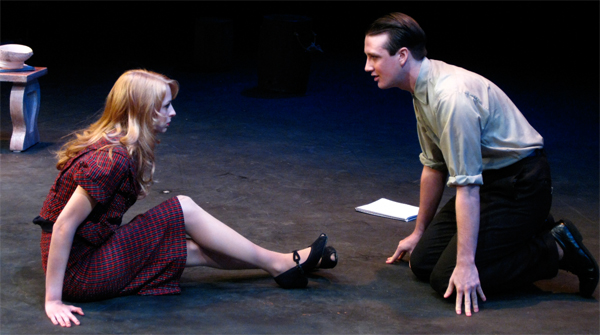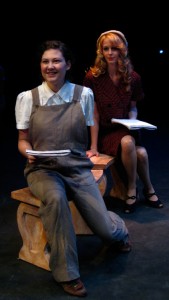

When World War II ended in 1945, the lives of many had abruptly ended. “The Wakeville Stories,” a recent production from the SUNY New Paltz Department of Theatre Arts, tells the tales of five characters woven together and linked by the trials and tribulations that come with moving on from tragedy – and surviving.
“When I first read the play, I knew I immediately wanted to work on it,” said Director Stephen Kitsakos, a professor of Theatre Arts. “It is a deceptively complex play layered with many textures. I am also particularly taken with the time period.”
Set during the late summer of 1945, “The Wakeville Stories” was performed at Parker Theatre between Oct. 23 and 24 and was written by Lecturer Laurence Carr.
According to Carr, since the first development of “The Wakeville Stories” in 1983, it has gone through several changes.

Carr said he first began by constructing the second act. After many suggestions and rewrites, he was able to formulate his story with its first, third and fourth actS.
“The process was very sort of methodical and slow,” Carr said. “But it was worth it to get to where this version is.”
Instead of being treated as a full stage production, “The Wakeville Stories” was treated as a staged reading, meaning actors were able to utilize scripts during performances.
According to Kitsakos, staged readings serve the ears of the playwright and treat audience members as “eavesdroppers of a private collaboration.”
Kitsakos said one of his biggest challenges was deciding when scripts would be strategically placed out of a scene.
“I had to pick and choose judiciously which moments could be played without the script and which moments could be played with the script in hand,” Kitsakos said. “I had only three days to put it up in the theater so I had to carefully plan the movements of the actors beforehand.”
Kitsakos said rehearsals required close-analysis of the script and usually took place sitting around a conference table in the Student Union.
According to the director, this method of practice was the exact opposite used in most staged productions.
“Usually, the director gets the play or musical up on its feet and then works it continuously,” Kitsakos said. “The layering of the character comes afterward and gradually through physicalization. This was both a challenge and a reward for the actors.”
For fourth-year theatre performance major Nicole Carroll, who played the character Six, the weekly rehearsals were an incredibly positive experience.
Because of the extended amount of time devoted to the discussion of themes and characters behind the scenes, Carroll said “The Wakeville Stories” generated fantastic debates and conversations between herself, classmates and audience members.
“It was so interesting to hear different people’s reactions and interpretations of the characters and a lot of it really enlightened me to aspects of Six that had never crossed my mind,” she said. “People seem to have really developed an interest and emotional attachment to our characters, as have I.”
Carr said the entire cast was very open and magnanimous to his presence during rehearsals – so much so that he was able to provide feedback and make changes to the script.
Acting as a “recorder,” Carr said he enjoyed seeing the actors’ unique interpretations of his characters during performances.
“I wrote [the play], but [the actors] are showing me what it is,” Carr said. “Then I can go back and re-work it off their impulses. It’s an intense creative process.”
With performances of “The Wakeville Stories” now at an end, Carr said he has been inspired to continue working on his script for future productions and publishing.
“The experience has been so informative about this play,” he said. “They’re helping me get this play to the next level and you can’t buy that. It’s just this incredible gift I’ve been given by this department and these wonderful people.”
